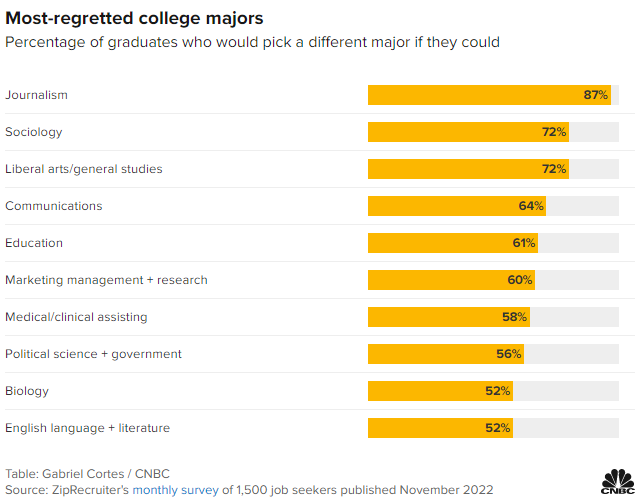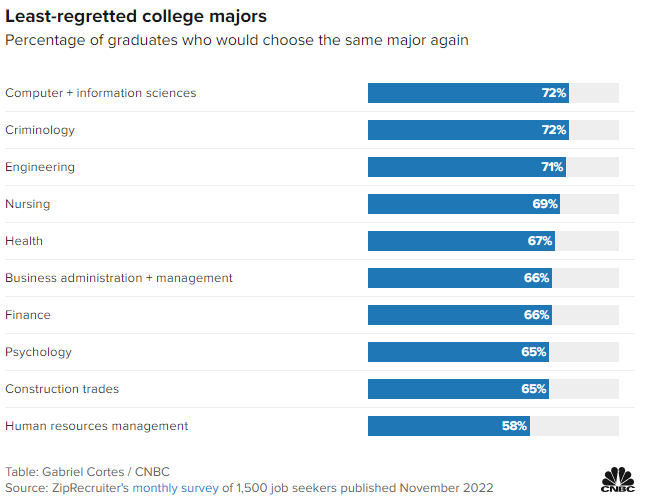KEY POINTS
- Between the sky-high cost and student loan burden, more students are taking a closer look at college’s return on investment.
- When it comes to value, what you study may be the most important factor.
- Graduates entering the workforce with good career prospects and high starting salaries are the most satisfied with their major, according to job site ZipRecruiter.
Even with college application season in full swing, many families are questioning whether a four-year degree is still worth it.
Some experts say the value of a bachelor’s degree is fading and more emphasis should be directed toward career training. A growing number of companies, including many in tech, are also dropping degree requirements for many middle-skill and even higher-skill roles.
However, earning a degree is almost always worthwhile, according to “The College Payoff,” a report from the Georgetown University Center on Education and the Workforce.
Bachelor’s degree holders generally earn 84% more than those with just a high school diploma, the report said — and the higher the level of educational attainment, the larger the payoff.
When broken down by areas of study, however, the difference is striking. Students who pursue a major specifically in science, technology, engineering and math — collectively known as STEM disciplines — are projected to earn the most overall.
In addition to STEM, health and business majors are among the highest-paying, leading to average annual wages that are higher at the entry level and significantly greater over the course of a career compared with liberal arts and humanities majors, the Georgetown Center found.
10 most-regretted majors: After graduation,‘reality hits’
Still, 44% of all job seekers with college degrees regret their field of study.
Journalism, sociology, communications and education all topped the list of most-regretted college majors, according to ZipRecruiter’s survey of more than 1,500 college graduates who were looking for a job.

Although students may be drawn to those fields while they’re in school for reasons beyond salary and job security, “when we graduate, reality hits,” said Sinem Buber, ZipRecruiter’s lead economist.
“When you are barely managing to pay your bills, your paycheck might become more important.”
Of graduates who regretted their major, most said that, if they could go back, they would now choose computer science or business administration instead.
Become A Certified Admissions Professional
Join AACAP!
Good prospects, higher pay means less regret
All in, the top-paying college majors earn $3.4 million more than the lowest-paying majors over a lifetime.
Graduates entering the workforce with good career prospects and high starting salaries are the most satisfied with their field of study, job site ZipRecruiter also found.
Least-regretted college majors
Percentage of graduates who would choose the same major again

Computer science majors, with an average annual starting salary of almost $100,000, were the happiest overall, according to ZipRecruiter.
Students who majored in criminology, engineering, nursing, business and finance also felt very good about their choices.
Career outcome sets the tone, said Buber. “Pay is still most important,” she said, but “job security is now becoming more important. That happens whenever we have the fear of a recession.”
